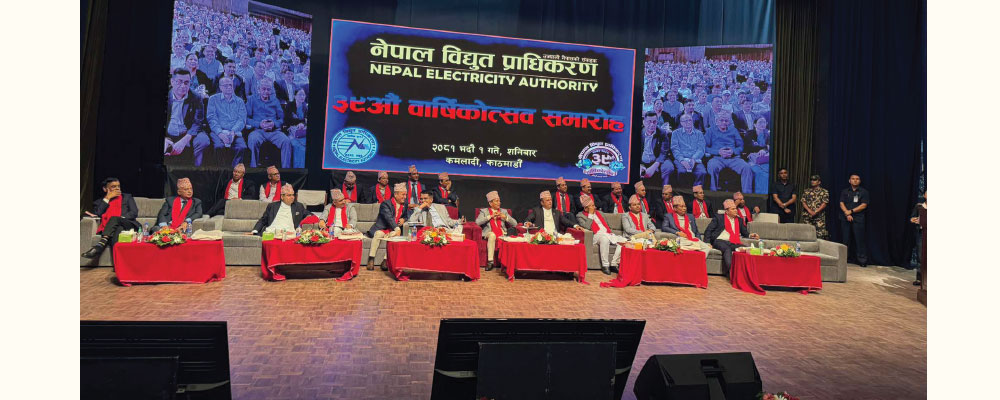Kathmandu, Aug. 18: Minister for Energy, Water Resources and Irrigation Dipak Khadka has said that the arrears of electricity consumed through trunk and dedicated lines should be paid.
Addressing the 39th anniversary of Nepal Electricity Authority on Saturday, Minister Khadka said that if the industries had consumed electricity through dedicated and trunk lines as per the law, then they should pay the dues.
He, however, maintained that cutting electricity supply in industries was like ‘slitting the throat’ of an individual. “Slitting the throat is the end of everything,” he said in apparent reference to cutting supply lines to industries which play a vital role in employment generation and overall development of the country.
He accused the NEA of cutting the lines even though there is a provision to take other actions against the industrialists who do not pay the dues of trunk and dedicated lines.
“Everyone has to pay for using electricity. It has been priced. But it is necessary for the state to pay attention to whether what is said to be paid is fair and justifiable,” said Minister Khadka.
He directed the NEA for focusing on infrastructure development such as transmission and distribution lines and substation for the utilisation of produced energy and make supply system reliable and qualitative.
Stating that the private sector was demanding the withdrawal of the new proposed electricity bills, he said that as the bills were under discussion in the concerned parliamentary committee, it will not be withdrawn, but the suggestions and demands raised by the private sector would be included in the bill.
Khadka said that it was necessary to make the country prosperous by developing the energy sector through mutual cooperation and coordination between the government and private sector by making maximum use of the water resources available throughout the country.
He said that the concerned authorities should work effectively to achieve the goal of producing 28,000 megawatts of electricity by 2035.
Minister Khadka said that if the target set by the government could be fulfilled, energy consumption can be increased in the country, industrialisation would be developed and employment will be created, and the opportunity to earn more foreign currency from the export of surplus energy.
On the occasion, State Minister for Energy, Water Resources and Irrigation Purna Bahadur Tamang has suggested the NEA to pay attention to the quality of work while constructing transmission lines, substations and laying electricity poles.
Gopal Prasad Sigdel, Secretary at the Ministry of Energy, Water Resources and Irrigation, said the government has been preparing the integrated energy policy for the development of energy sector.
Stating that there is huge market for electricity trade, he said that it was necessary to maximize the utilization of Nepal’s hydropower potential focusing on production and transmission lines.
He further said that it was necessary to increase domestic consumption of electricity and export as well to make the country’s prosperity from hydropower.
President of Independent Power Producers’ Association, Nepal (IPPAN) Ganesh Karki said that if the NEA become strong financially, the private sector would be benefited from it.
He urged the government to encourage private sector to increase their investment in hydropower through the introduction of private sector-friendly environment.
Managing Director of NEA Kul Man Ghising said that due to the increase in electricity tariff arrears of industrial customers, who have taken power supply from dedicated and trunk lines, local level road users and government offices, the task of collecting the arrears was becoming complicated.
He said that the NEA had been advancing the infrastructure developments, including transmission and distribution lines, substation for reliable power supply inside the country and increase export of surplus electricity.
“The Authority will continue to build hydropower projects with domestic capital through its own and subsidiary companies and affiliated companies, and will focus on building high-capacity reservoir, semi-reservoir and pump storage projects. In particular, the construction work of Dudhkoshi of 670 megawatts, Upper Arun of 1,063 megawatts and others will be carried out with financial management,” he said.
Ghising said that the detailed study of 10,800 MW Karnali Chisapani, which can be carried forward as a model project in the South Asian region, has been started.
He said that in the next 10 years, the Authority plans to develop the necessary infrastructure to export 10,000 megawatts of electricity to neighbouring countries. He said that by keeping the work of expanding the distribution system as a high priority, electricity would be supplied to the doorsteps of all Nepalis in the country within a year.



COMMENTS